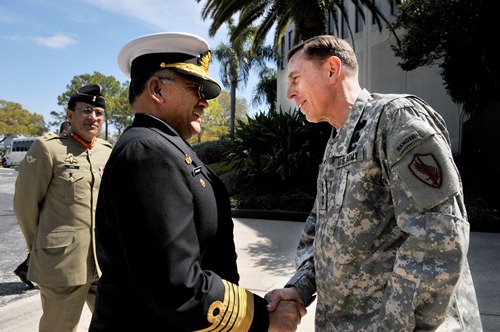Where the Real Fight Is
Foreign Policy |
By Michael Cohen and Parag Khanna
Why Pakistan, not Afghanistan, should be the focus of Obama's war on terror.
The conventional wisdom in Washington -- and the core of U.S. President Barack Obama's "Af-Pak" policy, which he announced in March -- is that Afghanistan is now the central front in the conflict formerly known as the war on terror. Pakistan is essential too, of course, and indeed, the thinking goes, you can't have a successful Afghanistan policy without a successful Pakistan policy. The problem with this conventional wisdom is that it gets the situation entirely backward: The real fight is in Pakistan, not Afghanistan, and a successful Af-Pak policy would be to minimize the "Af" part and maximize the "Pak."
Although Obama has committed an additional 20,000 troops to Afghanistan, as well as additional resources, some recent and far more discrete successes in Pakistan suggest that the United States might be putting its eggs in the wrong basket. With improved U.S.-Pakistani intelligence-sharing, U.S. drones killed more than 40 commanders loyal to Baitullah Mehsud, head of the Pakistani Taliban, in Waziristan last week. The U.S. ability to rout the Taliban and al Qaeda leadership in Pakistan is increasingly showing results while the counterinsurgency mission in Afghanistan is wracked with uncertainty and dubious prospects for success.
Indeed, much of the U.S. strategy in Afghanistan is dedicated to stopping the Taliban from returning to power. But the group is deeply unpopular, and its prospects of taking over the country are remote. Even more dubious is the idea that such a return would mean a reprise of pre-9/11 days, when al Qaeda built a substantial terrorist infrastructure in Afghanistan. Bin Laden's outfit has had no active presence in that country since 2002, and even if it were somehow able to regain one, the same pilotless drones wreaking havoc in Pakistan could do the same in Afghanistan. In effect, the United States is undertaking a $65-billion-a-year campaign in Afghanistan to defeat an enemy that is, for the most part, located across the border.
Further, the U.S. mission is moving away from the goal of fighting the enemy and toward nation-building and establishing the legitimacy of the Afghan government. Today's Army mission statement for Afghanistan says "killing the enemy is secondary" to the larger goal of "protecting the populace." Preventing a return of al Qaeda to Afghanistan is important, but a long, state-building mission in one of the world's most underdeveloped countries is the costliest and least effective way to accomplish that goal. If, that is, it is accomplishable at all. Building up the Afghan government to serve as a credible presence throughout the country will be an extraordinarily difficult mission. Corruption is rampant, and the Afghan Army and police are unable to provide any significant assistance to the counterinsurgency mission. After eight years, the face of the war in Afghanistan is that of a U.S. soldier, and it will likely remain so for the foreseeable future. Perhaps the better approach -- and the United States can do it, as it did in Iraq -- is to work with local Afghan leaders to target insurgents while also enticing senior Taliban commanders to "flip" and even give up al Qaeda figures if they come over the border from Pakistan.
The even better course of action is to shift the weight of U.S. political and military efforts to Pakistan. There, the United States should continue its policy of waging drone attacks against al Qaeda and Taliban leaders. With better intelligence from the Pakistani side -- as demonstrated recently -- the U.S. Army can improve the accuracy of its strikes. And though drone strikes are controversial, targeting al Qaeda's leadership is the best military strategy -- and the best way to protect Americans, Afghans, and Pakistanis from terrorism. And that fight is in Pakistan, not Afghanistan.
What's more, though nation-building in Afghanistan is an unlikely proposition even in the long term, nation-building in Pakistan is essential -- and achievable. Pakistan's military, including its Frontier Corps and police, needs U.S. assistance to build its capability to "clear, hold, and build" in the country's tribal areas. The impending Pakistani military operation into North Waziristan, on the heels of its offensive in the Swat Valley, is a difficult challenge in harsh terrain. And U.S. military assistance should go hand in hand with greater U.S. coordination between both Afghanistan and Pakistan to prevent the movement of al Qaeda and Taliban operatives back and forth across the border.
To be sure, Pakistani nation-building will not succeed without Pakistani support and ownership. Until the country's political and military establishments commit more resources to meeting this objective, any short-term security gains -- both in Afghanistan and Pakistan -- will quickly be erased. The Pakistani tribal areas, for example, don't need the stillborn pipe dream of U.S.-backed "reconstruction opportunity zones." They need provincial reconstruction teams of their own, such as those that have jump-started local governance reform and economic activity in parts of Afghanistan.
Ultimately, the current U.S. strategy in Afghanistan will cost significantly more in U.S. blood and treasure, and it has at best a marginal chance of success. Far better would be a more limited strategy that eschews the goal of nation-building in Afghanistan and embraces that goal in Pakistan. It is there, not in Afghanistan, that the United States can deal al Qaeda a devastating blow and foster regional stability. The sooner the United States realizes that the better.
